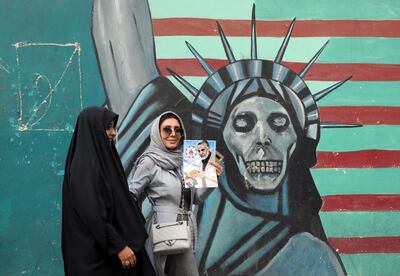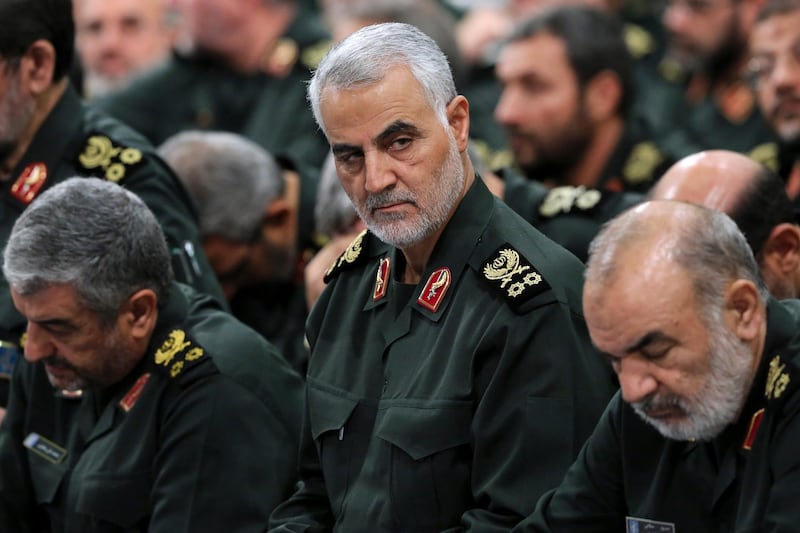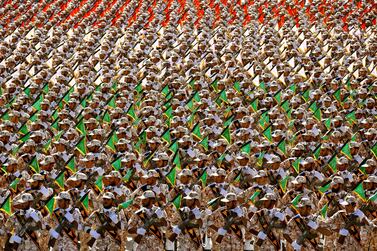US Secretary of State Mike Pompeo said the commander of Iran's Quds Force, Maj Gen Qassem Soleimani, is a terrorist and will be viewed the same way as extremists including ISIS leader Abu Bakr Al Baghdadi.
Washington designated Iran's Islamic Revolutionary Guard Corps as a terrorist group on Monday. Saudi Arabia and Bahrain added the organisation to their terrorism lists in October last year.
It is not clear if that makes Maj Gen Soleimani a military target of the Gulf states.
“He’s a terrorist. Qassem Soleimani has the blood of Americans on his hands, as do the forces he leads,” Mr Pompeo told US broadcaster Fox.
"America is determined each time we find an organisation, institution or an individual that has taken the lives of individuals, it is our responsibility to reduce that risk," he said.
The move to designate the IRGC as a terrorist entity was made as elections take place in Israel, leading to scepticism that the decision was meant to influence Israeli voters.
Mr Pompeo said that the IRGC killed more than 600 American soldiers.
“You can’t have peace, you can’t have stability, you can’t have security in the Middle East without weakening the Islamic Revolutionary Guard Corps," he said.
Riyadh welcomed Washington’s decision, Saudi state news agency, Spa, reported on Tuesday.
Saudi Arabia has accused Iran of interfering in its internal affairs and of trying to destabilise the region.
"The US decision translates the kingdom's repeated demands to the international community of the necessity of confronting terrorism supported by Iran," a Saudi Foreign Ministry source told Spa.
Last year, the Trump administration said that the IRGC was a state sponsor of terrorism and used and promoted terrorism as a tool of Tehran.
Iran denied the accusations and responded by designating American forces in the region as a terrorist organisation.

Washington has taken a hard-line stance against Shiite extremist groups under Mr Trump’s reign, having most recently designated Hezbollah as a terrorist entity.
Many say Hezbollah is funded by Iran and accuse it of taking orders from Tehran.
Within hours of the US declaration, Iran's Supreme National Security Council responded by designating the US Central Command and all its forces as terrorist, and called Washington a "supporter of terrorism".
Iranian MPs dressed in paramilitary uniforms chanted "death to America" as they convened on Tuesday after the White House move.
Parliament Speaker Ali Larijani denounced the US decision as the "climax of stupidity and ignorance".
The Supreme National Security Council's spokesman, Keivan Khosravi, said: "Any unusual move by American forces in the region will be perceived as the behaviour of a terrorist group."
President Hassan Rouhani said the force's popularity would only surge after the US designation. IRGC members would be dearer "than any other time in the hearts of the Iranian nation".
Washington's decision marks the first time that the US has called an army of a foreign government a terrorist group.
It means that anyone who deals with the IRGC could face prison in the US.
US President Donald Trump called the corps – which has about 125,000 troops and vast economic interests in Iran – Tehran's "primary means of directing and implementing its global terrorist campaign".
Saudi Arabia broke off diplomatic relations with Tehran in 2016 in protest against the torching of its diplomatic missions by Iranian protesters angry over its execution of a leading cleric.






